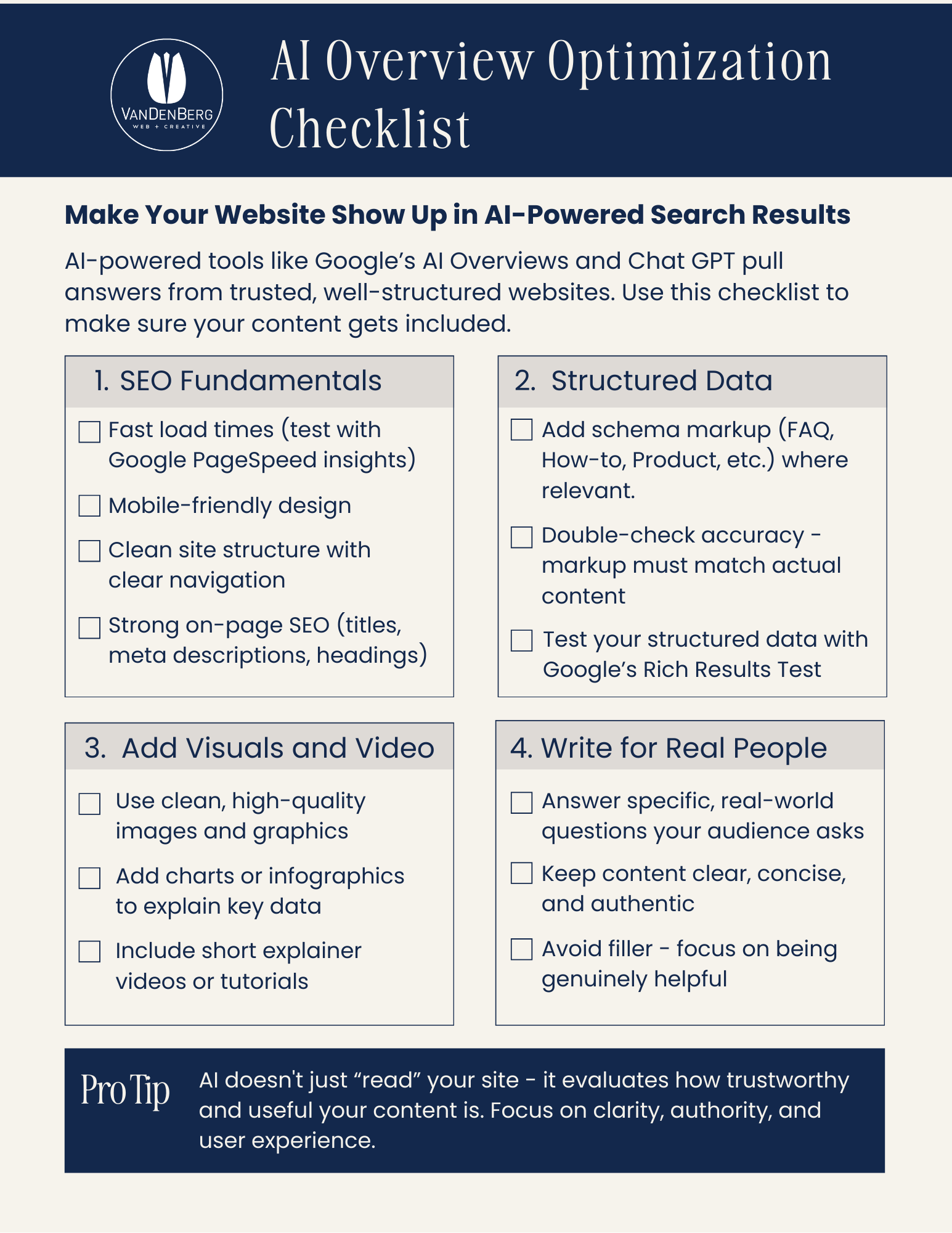
As search engines evolve into “answer engines,” traditional SEO alone isn’t enough. Google’s AI Overviews and tools like ChatGPT now deliver synthesized answers—pulling from websites they trust.
And the shift is happening fast:
Google’s AI-generated answers now appear in 13.14% of U.S. desktop searches (more than double what it was just two months prior), and nearly 49% of all search results include an AI Overview as of May 2025. In fact, about 18% of all global searches already feature AI Overviews. That means if your site isn’t optimized for this new reality, you could be invisible where it matters most.
So how do you get your content included?
Here’s where to start:
Stick to SEO Fundamentals
Fast load times, mobile responsiveness, clean structure, and strong on-page SEO still matter. Most content cited by AI is already ranking well in traditional search.
Why? Because authority and technical quality are still the foundation. When AI scans for trusted answers, it often pulls from the same sites already performing well. And with research showing 19.56% of Google’s top 20 search results are now AI-generated content, the competition is only heating up.
Need to tighten up your SEO before tackling AI? Check out our Local SEO services.
Write for Real People
Answer real questions. Be specific. Be helpful. AI and humans both respond well to content that’s clear and authentic.
60% of searches now end without a click—users are satisfied by the answer they get directly in search. But when your site is featured, clarity and usefulness can drive the small percentage of people who do click (about 8% when an AI Overview is shown, compared to 15% when it isn’t).
Add Visuals & Video
AI can “see” your visuals. Clean images, charts, and short videos make your content easier to interpret—and more likely to be featured.
With so much content now being synthesized, having clear visual assets sets your site apart and makes it easier for AI to extract accurate, high-value information.
Use Structured Data Thoughtfully
Schema markup helps search engines and AI understand your content—but accuracy matters. Match it to what’s actually on the page.
Think of it as “labeling” your answers for AI. Just as product schema helps Google Shopping showcase your items, FAQ or How-To schema helps AI answer engines lift your content into their summaries.
Optimize Your Authority
Content published on high-authority sites or shared across credible platforms is more likely to be cited in AI responses.
Bain research shows 80% of consumers now use AI-generated content for 40% or more of their searches, and brands that don’t adapt could lose 25–40% of their organic traffic in the next year. If you want AI engines to trust you, you need backlinks, mentions, and shares that reinforce your credibility.
Key Takeaways:
-
Strong SEO fundamentals remain the foundation.
-
Write helpful, clear, and people-focused content.
-
Use visuals and video to make your content easier to interpret.
-
Apply structured data accurately to guide search engines.
-
Build authority and trust through credible platforms and backlinks.

The bottom line? If you want your website to show up in AI-generated answers, start by making it easy to find, easy to trust, and genuinely helpful.
AI Overviews and chat-based tools aren’t killing SEO—but they are reshaping it. By combining fundamentals with people-first content, visuals, structure, and authority, you position your site not just to rank, but to be the answer.
Ready to Future-Proof Your Website?
Let’s talk about how to get your website showing up in AI search results.
Book a Free Consultation or call us today to get started.
What is the difference between traditional SEO and optimizing for AI-powered search?
Traditional SEO focuses on ranking your site in search results, while AI-powered search looks for trustworthy, clear, and well-structured content to cite directly in answers.
Do I need to change my entire SEO strategy for AI search?
Not at all. The fundamentals of SEO still apply. The difference is that you should focus more on answering specific questions, using visuals, and structuring content so AI tools can easily understand it.
How important is structured data for AI search results?
Structured data (schema markup) is very helpful, but only if it accurately reflects your content. Think of it as a way to “label” your content for AI and search engines.
Can smaller local businesses show up in AI-generated answers?
Yes! If your content is well-written, answers real questions, and establishes authority in your niche, AI tools can pull from your website—even if you’re not a big brand.
What’s the best first step to take if I want my website featured in AI answers?
Start by auditing your current site: check page speed, mobile performance, on-page SEO, and whether your content clearly answers the questions your audience is asking.

